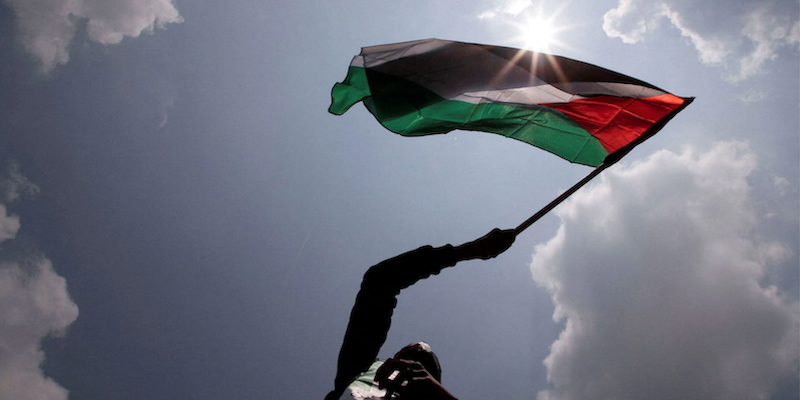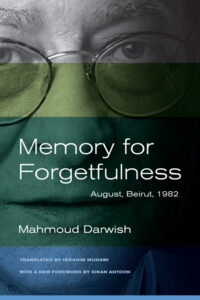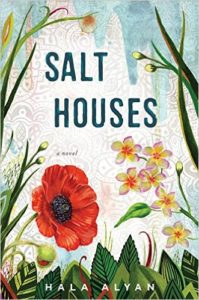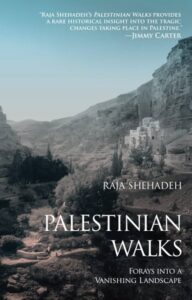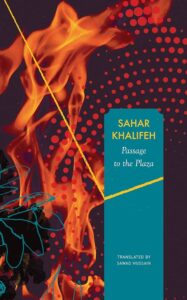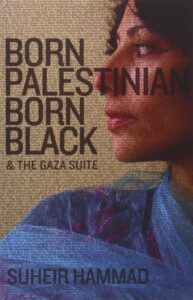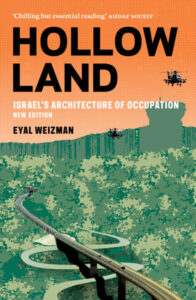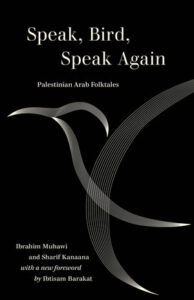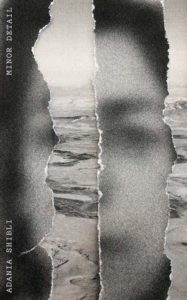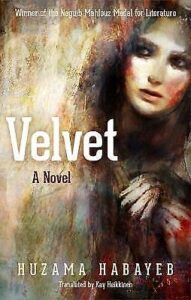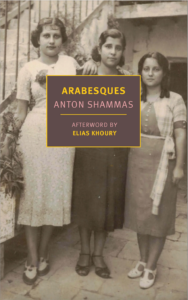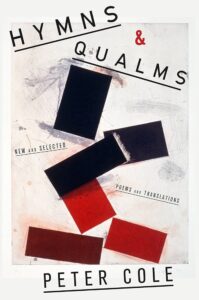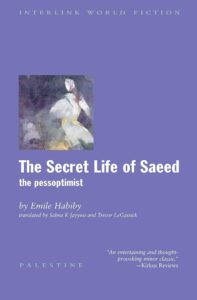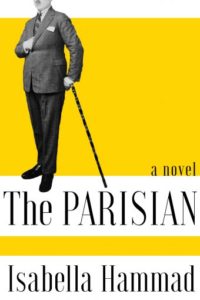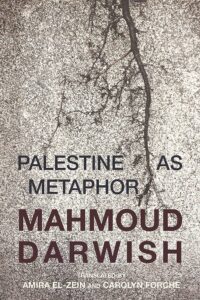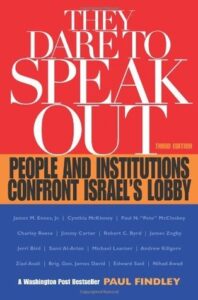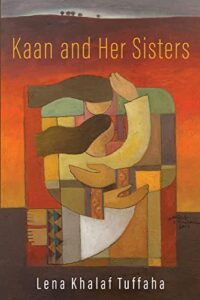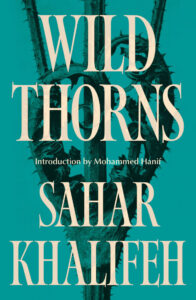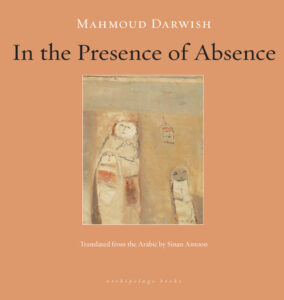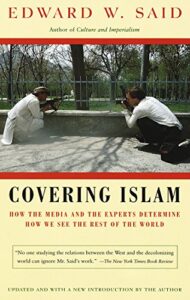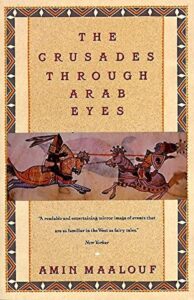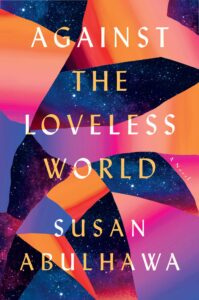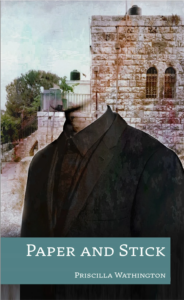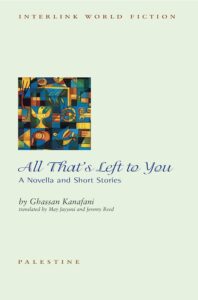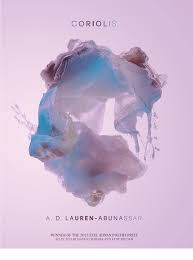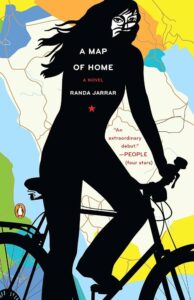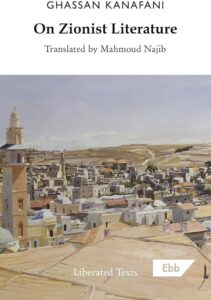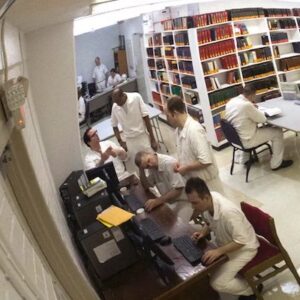In the last 38 days, more than 11,000 Palestinians have been killed by Israeli airstrikes in Gaza. Another 190 have been killed by Israeli army fire and settler violence in the West Bank. Tens of thousands of people have been severely wounded and traumatized. 1.7 million have been displaced.
Throughout these weeks of mass death and dehumanization—to say nothing of the 75 years preceding—an incalculable number of Palestinian stories have been erased.
We wanted to create a list of books that would serve as a reminder of the precious individual stories and humanities of the Palestinian people, as well as an evergreen resource for all readers interested in engaging with the rich, vibrant tradition of Palestinian literature—both in this horrific moment and, hopefully, long after the current assault on Gaza has ended.
To do so, we reached out to several dozen Palestinian and Palestinian-American authors, as well as a number of other writers whose work and advocacy has focused on Palestine, to ask them to recommend their favorite works of Palestinian literature. We hope that the below list of titles serves as an illuminating introduction to that canon.
–Dan Sheehan
*
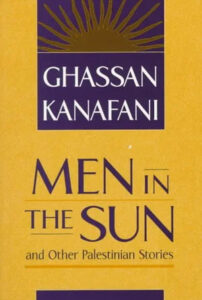
Men in the Sun by Ghassan Kanafani (trans. Hilary Kilpatrick)
I found this slim volume of short stories in the American University Cairo bookshop when I was 22. I had never heard of Kanafani. Whenever someone asks me about the transformative power of literature, I retreat back to the moment of reading this collection. “Men in The Sun,” the titular story of a deathly journey of Palestinian migrants to Kuwait in the back of a water tanker, and “Land of Sad Oranges,” articulated my heritage in a way I had never experienced previously. To explain: my father is from Jaffa, Palestine, and Kanafani is from Acre. Kanafani was two years older. Both of their families were expelled in 1948 and, together with almost a million other Palestinians, they both became refugees as children. My father once saw Kanafani, who was then an unpublished teenager, in a cinema in Damascus. He was, my father relates, serious for his age and incredibly keen on writing, but neither as good looking, nor as tall as my father was. My father, who was going through a phase of disaffection at the time, was envious of Kanafani’s notebook, his dedication, and his beautiful handwriting.
Thirty years later, as a disaffected teenager in Kuwait, literature was always my portal of escape. My preferences were for 19th century French and Russian literature, most notably Emile Zola, Ivan Turgenev, and Fyodor Dostoyevsky. To me, literature was Great, but it was also European, Male, and Past. What Kanafani did was to communicate the immediate, emotional pulse of personal and political trauma, love and family bonds that ran through our lives, whilst also creating a collective sense of resistance in his work. He was assassinated in 1972 by a car bomb in Beirut. His niece died with him. Some of his more experimental works are less powerful, in my view, but this volume set me on my life journey, which sometimes I wish I could get off, but can’t.
–Selma Dabbagh
A collection of short stories about the plight of displaced Palestinians. The titular story, and the longest in the collection, follows three men as they make their way to Kuwait. There are also shorter stories that all illustrate some aspect of the hardship of displacement and dispossession. The translation from the Arabic original does full justice to Kanafani’s beautiful prose, and the introduction is extremely valuable for readers unfamiliar with the context of the stories.
–Nada Elia
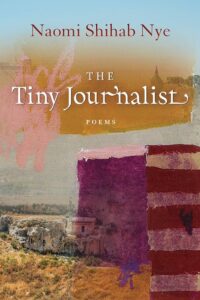
The Tiny Journalist by Naomi Shihab Nye
Every day for the past several weeks, I’ve been reading poetry by Palestinian and Palestinian American writers. I turn to these poems for solace in the early morning, at my office at work, in bed at night. I read verses that celebrate the richness of Palestinian history and culture, and verses that demand justice and freedom for Palestine. Naomi Shihab Nye’s fiercely political collection The Tiny Journalist captures daily life under Israeli occupation: the unlawful incarceration of Palestinians; the terrifying airstrikes; the massive barrier wall that cuts through Palestinian land. The poem “ISRAELIS LET BULLDOZERS GRIND TO HALT” dramatizes the deliberate misuse of language in American reporting on the Arab-Israeli conflict, language “covering the pain/big bandage/masking the wound” of Palestinians.
There are heartrending poems about Gaza, such as one told from the point of view of the moon, who looks down on the narrow strip of land and sees “no reason for the sorrows humans make” and dislikes “the scuffle of bombs blasting.” There are others about Jerusalem, “everyone’s city.” These unflinching poems aren’t told from the voices of the defeated. They’re voices that, despite their pain, speak out against Israeli occupation and violence. They’re human voices that refuse to be silenced.
–Ghassan Zeineddine
Memory for Forgetfulness by Mahmoud Darwish (trans. Ibrahim Muhawi)
This prose poem memoir bears witness to the ravages of the Israeli siege of Beirut in 1982 while simultaneously interrogating the role of memory. In this beautiful book, Darwish asks, what is the role of the poet in wartime? How do we save the soul beneath the deafening sound of rockets? Darwish writes in one passage: “Why am I looking for the paper when buildings are falling in all directions? Is that not writing enough?”
–Hannah Lillith Assadi
His poetic prose reflection of the bloody 1982 Israeli invasion of Beirut. The surreal precarity of life under siege and bombardment is captured in a dreamlike web of ideas and memories and observations by the masterful poet laureate of Palestine.
–Ismail Khalidi
Salt Houses by Hala Alyan
Hala Alyan’s debut novel, Salt Houses, is a beautiful, heartwrenching remedy to the rampant dehumanization of Palestinians. Telling the story of a single family over three generations, Alyan maps their lives, displacements, and migrations from Palestine to Kuwait and America to France. It is a poignant reminder of the way the Nakba and colonialism more broadly has shaped the histories, present(s), and futures of Palestinian people. Simply a must read.
–Nicki Kattoura
Read an excerpt from Salt Houses here
Palestinian Walks: Forays Into a Vanishing Landscape by Raja Shehadeh
Because of course you want to scream. You want to shout. But as a writer, you know that the Screaming/Shouting Section of the bookstore is filled to overflowing, that none of the books are particularly interesting, and that customers never visit that section anyway. And so, in Palestinian Walks, Raja Shehadeh doesn’t scream. He delivers instead a love letter to a place of natural beauty that is disappearing beneath his feet. He recounts six different sarhat—like a hike, but more delightfully aimless—that he has taken over the past twenty-six years in the Central Highlands around his home of Ramallah, where flora and fauna are increasingly displaced by checkpoints and guns. No screams, no shouts, just love and loss and longing: for a home, for nature, for a life of normalcy in this place of astounding beauty that has been torn through by an ever-widening river of tears. It’s enough to make you want to scream.
–Shalom Auslander
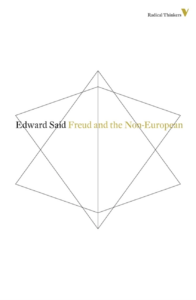
Freud and the Non-European by Edward Said
At a time when tribal affinities tend to solidify and harden, this rich and surprising lecture by Edward Said reminds us that there is no such thing as pure identity, and that identity is inherently mixed and unresolved. Applying this non-exclusionary understanding of identity to today’s politics, Said proposes an exit from the duel, and hints at a possible future where Jews and Palestinians are parts of each other, rather than antagonists.
–Yasmin Zaher
Bab al-Saha or Passage to the Plaza by Sahar Khalifeh (trans. Sawad Hussain)
I recommend Bab al-Saha or The Passage to the Plaza by Sahar Khalifeh, which is set in the city of Nablus during the Intifada of 1987. This novel is a lively, rich, clear-eyed, and unsentimental portrait of the plight, struggle, and strength of Palestinian women living under a violent military occupation.
I’d also recommend everyone to read Ghassan Kanafani’s “Letter from Gaza,” written in 1956. Israel assassinated Kanafani in 1972 with a car bomb when he was only 36, and yet during his short life he produced some of the most vivid and significant literary and non-fiction writings on the Palestinian experience.
–Isabella Hammad
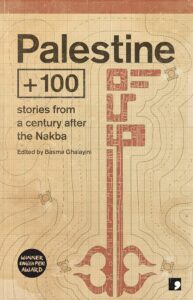
Palestine +100: Stories From a Century After the Nakba edited by Basma Ghayalini
The Palestinian-British editor of this futurist collection asked 12 writers to imagine the world a hundred years from the 1948 Nabka or catastrophe that befell the Palestinian people. As of 2023, we still don’t know what the future portends, but the present moment continues to serve up more of the same oppression from Palestine’s overlords.
–Jordan Elgrably
Read a story from Palestine +100 here
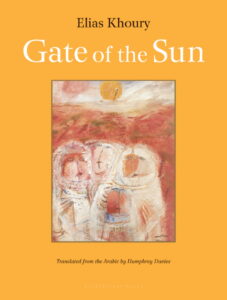
Gate of the Sun by Elias Khoury (trans. Humphrey Davies)
Elias Khoury is Lebanese, but his finest novel, 1998’s Gate of the Sun, draws on years of interviews with Palestinian refugees. It is a dizzying, masterfully spun epic about the Nakba, exile, memory, and loss. At its core is a massacre—the one that occurred in 1982 in Beirut’s Sabra and Shatila camps—but also a refuge, a cave where a resistance fighter secretly meets his beloved, a hidden space of love and tenderness that is both inside and outside of history, and without which history cannot be understood.
–Ben Ehrenreich
It completely changed my perspective while I was writing The New Earth. The focus is Palestinian refugees and resistance fighters—fedayeen—in Lebanon at the time of the Sabra and Shatila massacre in 1982, but it opens up a history that goes back to the 1948 Nakba and the lives of Palestinians in the Galilee many generations before that.
–Jess Row
Born Palestinian, Born Black by Suheir Hammad
The first collection from the brilliant, boundary-breaking poet Suheir Hammad. Since she burst onto the scene in the late 1990s and early 2000s, she has been a trailblazer for younger Palestinian and Arab American poets and spoken word artists. Suheir’s work is fire, at once profoundly Palestinian and perfectly Brooklyn.
I would argue that besides being an excellent poet in her own right, Hammad also foreshadowed the intersectional moment of today, articulating anew for second generation immigrants (and beyond) the Palestinian-Black solidarity that they felt in their bones but which—despite having existed previously—had never quite been conjured in such an organically hybridized form.
–Ismail Khalidi
Hollow Land: Israel’s Architecture of Occupation by Eyal Weizman
This book by Eyal Weizman, an Israeli architect who teaches at Goldsmiths in London and is the founder of Forensic Architecture, is indispensable to understanding the spatial violence of the Israeli occupation. From the illegal checkpoints and settlements, to the apartheid wall and siege on Gaza, he highlights the way that Palestinian land has been transformed into a militarized zone that controls every facet of Palestinian life. Reading this book truly exemplifies how the slow, invisibilized, daily violence Palestinians face is structural in nature and literally built into the occupation’s architecture.
–Nicki Kattoura
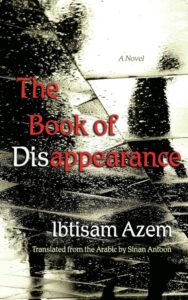
The Book of Disappearance by Ibtisam Azem (trans. Sinan Antoon)
When I first read The Book of Disappearance by Ibtisam Azem in 2014, I was haunted for days. The novel’s premise is the mass vanishing of Palestinians—tragically, a notion not so far-fetched as we bear witness to Gaza’s ethnic cleansing in real time. But this, along with seventy-five years of recorded displacement and death, does not diminish the profound effect of this contemporary work. Azem examines the inheritance and burden of memory, and how deeply it is rooted in our collective Palestinian psyche.
A main character named Alaa—in conversation with his dead grandmother, a survivor of the Nakba—bemoans: “I firmly believe now that all those who stayed in Palestine are mad. Otherwise how would they be able to bear the memory of those who survived, and those who didn’t? How can they live with this pain in the memory of the survivors.” Interspersed with Alaa’s story is Ariel, his Israeli friend, who must find ways to reconcile the sudden disappearance of his Palestinian neighbors. This raises a difficult, yet inevitable question: how might complacency turn into complicity? For its arrestingly layered storytelling of generational trauma and systematic erasure, Azem’s novel is an essential read. Now more than ever.
–Sahar Mustafah
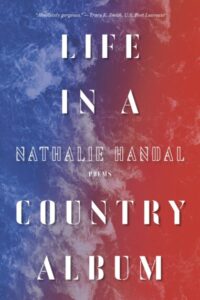
Life in a Country Album by Nathalie Handal
Nathalie Handal’s facility with language is the stuff of legend. She is fluent in Arabic, French, Italian, Spanish, and English, and her poetry has the feel of rare music; as though the native instruments from each one of the countries in which those languages are spoken, have come together to create a single symphony for the world. It is the world that she inhabits in Life in a Country Album, a collection that addresses all of our human fervencies as they are kept alive across borders: our citizenship, our foothold identities that straddle nations, our desire for each other, for belonging, and for freedom.
What is nation and what is identity when we are, above all else, who raised us and whom and what we love? Teju Cole wrote, of an earlier work (The Republics) that her poems are “full of hard truths, of things seen in extremis, and yet they do not leave us comfortless.” In a time when so many are awakening to the realization that change cannot come without acknowledging our present reality, and when so many of us also feel a wild despair, Handal’s poems are both crucible and balm.
–Ru Freeman
Read a poem from Life in a Country Album here
Speak Bird, Speak Again: Palestinian Arab Folktales
A collection of Palestinian folktales that is also a rich compendium of details about traditional pre-1948 Palestinian life and culture. At this moment when Zionist lies about the nonexistence of Palestine and Palestinians are everywhere in the media, this work of anthropology and folklore is more important than ever.
–Jess Row
Minor Detail by Adania Shibli (trans. Elisabeth Jaquette)
Kuwaiti novelist Layla AlAmmar published a laudatory review of the English translation of Shibli’s novel in 2020, and even three years later, this slim volume continues to stack up accolades and awards, justly deserved.
–Jordan Elgrably
Read an excerpt from Minor Detail here
Velvet by Huzama Habayeb (trans. Kay Heikkinen)
Velvet is the story of a life. Hawwa, the novel’s central character, lives in a refugee camp in Jordan, and through an immense capacity for both sensory and emotional detail, Habayeb invites the reader into the contours of Hawwa’s daily life, the kindnesses and cruelties that in one way or another upend it. This is a deeply human book, concerned with the often-dangerous workings of want.
It’s not particularly political in any overt way, and yet it is deeply political. In this moment of outright genocide, when so many of the most powerful people on the planet seem more than happy to cheer on mass slaughter, the very act of protrayting those on the recieving end of such barbarism as human, as made of life, as capable of desire and joy and resilience, is sadly still a radical thing. Even if it wasn’t, Velvet would still be a masterwork.
–Omar El Akkad
Arabesques by Anton Shammas (trans. Vivian Eden)
Originally published in Hebrew in 1986, Shammas brings the story of his family and his Galilean village into the Hebrew language. Chosen by The New York Times as one of the best books of 1988, Arabesques remains an intricate and poetic Palestinian tale which through the revelation of family secrets tie together the trajectories of various Palestinian characters. Translated into several languages (but yet to be translated into Arabic), Arabesques is a unique masterpiece that—as the latest edition published by the New York Review of Books testifies to—continues to belong the canon of world literature.
–Maurice Ebileeni
Read an excerpt from Arabesques here
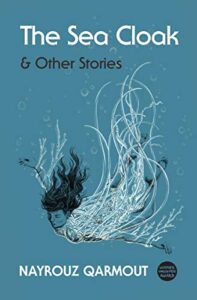
The Sea Cloak and Other Stories by Nayrouz Qarmout
What I appreciate the most about The Sea Cloak and Other Stories is the way it introduces us to the full spectrum of life in Gaza, dragging us by the hand to feel for ourselves the beating of the enclave’s heart. Reading these stories is like spending a day passing from one gracious home to another, being ordered to rest awhile and offered endless cups of tea while everyday tales are relayed to us by the bustling families we encounter. Thanks to the extraordinary sensory detail of Qarmout’s storytelling, we experience the political complexity of life in the Strip, but we also get to experience friendship and romance, parenting and childhood, in a context so colored by conflict.
In “Pen and Notebook,” we read about the young siblings who have to work to make ends meet after their father is shot through the spine—just one of the stories of survival in the “world’s largest open-air prison.” Still, nothing is more haunting than the constant reminders of the frailty of existence. In the book’s titular story, “The Sea Cloak,” a young girl is nearly pulled to her death by the dark waters, her billowing black dress a metaphor for the myriad burdens put upon Palestinians, burdens that threaten to suffocate them. “Maybe I wanted to die,” she thinks out loud to her rescuer, her voice echoing even more eerily today.
–Nashwa Nasreldin
“Revenge” by Taha Muhammad Ali (trans. Peter Cole)
It is hard to think of a work of literature that speaks more to this moment than the poem “Revenge” by Taha Muhammad Ali. It was written too late to be included in Taha’s final collection of poems, So What: New and Selected Poems, 1971-2005, translated by Peter Cole, Yahya Hijazi, and Gabriel Levin. But it can be found in Hymns & Qualms: New and Selected Poems and Translations, a beautiful collection of poems and translations by Taha’s close friend and translator, Peter Cole:
Revenge
At times … I wish
I could meet in a duel
the man who killed my father
and razed our home,
expelling me
into
a narrow country.
And if he killed me,
I’d rest at last,
and if I were ready—
I would take my revenge!
[…]
But if he turned
out to be on his own—
cut off like a branch from a tree—
without a mother or father,
with neither a brother nor sister,
wifeless, without a child,
and without kin or neighbors or friends,
colleagues or companions,
then I’d add not a thing to his pain
within that aloneness—
not the torment of death,
and not the sorrow of passing away.
Instead I’d be content
to ignore him when I passed him by
on the street—as I
convinced myself
that paying him no attention
in itself was a kind of revenge.
–Nathan Thrall
The Secret Life of Saeed the Pessoptimist by Emile Habibi (trans. Salma Khadra Jayyusi & Trevor Le Gassick)
From one of the great Palestinian-Israeli writers, this is one of the foundational pieces of fiction to understand the maddening (sur)reality of 2nd or 3rd class Palestinian citizens of Israel navigating impossible life choices in a country built on top of their own but not for them.
–Ismail Khalidi
The Parisian by Isabella Hammad
The young British-Palestinian’s debut novel provides a panoramic account of Palestinian lives across much of the 20th century, with stints in Montpellier, Paris, and Palestine.
–Jordan Elgrably
Read an excerpt from The Parisian here
Palestine as Metaphor by Mahmoud Darwish (trans. Amira El-Zein and Carolyn Forché)
It is impossible to choose just one work by Darwish, but Palestine as Metaphor serves as a doorway to them all. The book is a series of long interviews with Darwish: conversations with a Lebanese poet, a Syrian literary critic, three Palestinian writers, and an Israeli journalist. Each took place in a different city and each discussion contains universes: political theory, history, memoir, criticism, and poetry—as well as Darwish’s personal history and relationship to his readers.
–M. Lynx Qualey
They Dare to Speak Out: People and Institutions Confront Israel’s Lobby by Paul Findley
As a Palestinian-American author, I recommend former US Representative Paul Findley’s 1985 book, They Dare to Speak Out: People and Institutions Confront Israel’s Lobby. I don’t know Mr. Findley personally, and I am not a politician, but I am an author who grew up in Palestine under Israeli occupation (about which I have written two memoirs) and I have experienced the effects that pro Israel groups in the US have had on Palestinian voices. I’ve seen efforts to deter or block Palestinian stories from reaching readers, as well as the creation of dedicated watch groups on US campuses to guard against any education that includes Palestinian perspectives. I could write an entire memoir about those experiences in my own life. What inspires me daily, however, in spite of the attempted erasure of our stories, are the many Palestinians, and many other fellow humans, who do dare to speak out with integrity regarding Palestine, and who work toward healing humanity’s collective voice through their words.
–Ibtisam Barakat
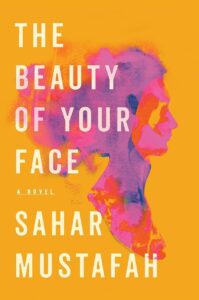
The Beauty of Your Face by Sahar Mustafah
Recounts an American story of Palestinian immigrants in the Chicago suburbs, and made the New York Times list of 100 Notable Books for 2020.
–Jordan Elgrably
Kaan and Her Sisters by Lena Khalaf Tuffaha
This book is a praise song to the women in our Arab communities who teach life, through language and literature and song, despite the impossible catastrophes that constitute Palestinian living. “Repetition is a Nakba” is one of the lines from this book that has been ringing in my head non-stop. Through multi-lingual and formally inventive poems, Tuffaha has not only written a book that speaks to our moment, but carries us into a better, more loving future in and for language.
–George Abraham
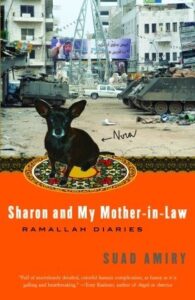
Sharon and My Mother-in-Law by Suad Amiry
“Pain in writing can be hilarious,” Geoff Dyer once said to me. Suad Amiry’s Sharon and My Mother-in-Law demonstrates exactly this. The book is a series of diary entries and correspondences that detail the absurdities that accompany living under military occupation, witnessing two intifadas, and surviving a forty-two day curfew with her husband and his mother. Amiry brings levity to the familiar struggles of daily life for Palestinians by juxtaposing them against the universal tension of mother in-laws. In the process, she offers collective relief from misery. Sometimes, when life is so brutal, the best you can do is find ways to laugh at it.
–Zaina Arafat
Wild Thorns by Sahar Khalifeh (trans. Trevor LeGassick and Elizabeth Fernea)
This is a classic novel and the first to recount the Palestinian experience in the West Bank under Israeli occupation.
–Jordan Elgrably
In the Presence of Absence by Mahmoud Darwish (trans. Sinan Antoon)
The prose of Mahmoud Darwish is no less significant that his poetry. This book, In the Presence of Absence, is a Palestinian epic in highly poetic prose. Darwish goes back to the essence of the Palestinian question, which is the Nakba, or the Catastrophe of 1948. My favorite of Darwish’s books, it is what the Palestinian cause could be as literature.
–Saleem Albeik
Covering Islam: How the Media and the Experts Determine How We See the Rest of the World by Edward Said
As a journalist in the the occupied Palestinan territories in 2005-2006, this book was not just a valuable tool, but a philosophical treatise on how we view people the Middle East, and how that configures into how we report on them. The battles are not just physical, but are wars of language, perception, and storytelling. Originally published in 1997, it could have been written yesterday. Of course, Said’s book Orientalism, is the mothership of how we see “others.” Why not buy both?
–Kerri Arsenault
The Crusades Through Arab Eyes by Amin Maalouf
This is my ‘out of left field’ choice. While the list of nonfiction titles that are more specifically about the question of Palestine is long and illustrious (from authors such as Edward Said, Ilan Pappe, Noura Erakat, Avi Shlaim, Rashid Khalidi, Amira Haas, and Saree Makdisi to name just a few), I figured I would add one that probably won’t make it onto other lists. Amin Maalouf’s classic is a must read to grasp one of the most important periods in the history of Palestine and one that served as the bloody precursor to modern European imperial and (settler) colonial projects (and projections) in the region, not to mention the roots of European Islamophobia, anti-semitism, and orientalism—forces still very much at play as we speak.
–Ismail Khalidi
Against the Loveless World by Susan Abulhawa
Winner of the Arab American Book Award for 2021, from the author of Mornings in Jenin, Against the Loveless World was the subject of an extensive essay in The Markaz Review.
–Jordan Elgrably
Read an excerpt from Against the Loveless World here
Paper and Stick by Priscilla Wathington
Priscilla Wathington’s short book, Paper and Stick, was published in 2021, but it’s been on my mind a lot this past month. Her poems are stunning in their depiction of the lives of Palestinian children in Occupied Palestine. Wathington is well suited to write on this subject, as a former managing editor for Defense for Children International: Palestine, an independent organization dedicated to defending and promoting the rights of Palestinian children.
The poems, in both what they say and what they erase, document the terror endured by children in the West Bank and Gaza: “what happened to me was a mouth | white Kia pulled/ over |,” she writes in “White Kia,” “inside a wavecurl/ a common gnaw | kidnapped us without saying a word/ my ribs/prayer in its cavity.” In “Deadline Extended,” she writes about children who are jailed in military prisons: “they tied me to that chair every time/ 15 times, but I never/ only to find the muscle is wood/ air that was coming into the cell.”
Wathington’s voice is clear and powerful, and above all, it reminds us of the ways in which the occupation destroys and erodes the notion of a normal childhood.
–Susan Muaddi Darraj
All That’s Left to You by Ghassan Kanafani (trans. May Jayyusi & Jeremy Reed)
Anything by Ghassan Kanafani really, but one of my favorites is All That’s Left to You. Shorter and perhaps more difficult than his best known novellas Returning to Haifa and Men in the Sun, it nonetheless packs a punch and is at once very much of its period and ahead of its time. It is particularly inventive in its form, with its rotating narrators and a rhythm unlike the aforementioned works. Spanning a roughly 24 hour period (but with flashbacks), Kanafani paints an intimate portrait of a brother and sister in Gaza and the brother’s dangerous escape through the desert, which is itself a character. Kanafani just has this way of breaking your heart.
–Ismail Khalidi
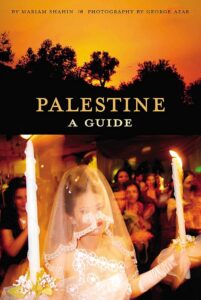
Palestine: A Guide, ed. by Mariam Shahin
It’s pretty difficult to find a guide to modern Palestine since most guides of Israel use different names for Palestinian towns and don’t include many other things of a Palestinian nature, like Palestinian roads, Palestinian history, Palestinian people, and so on. While the guide provides historic and cultural references, if traveling in the occupied Palestinian territories, you should get current maps from the United Nations Relief and Works Agency in East Jerusalem that show Israeli road blocks, checkpoints, and other issues that prevent you from moving easily around.
–Kerri Arsenault
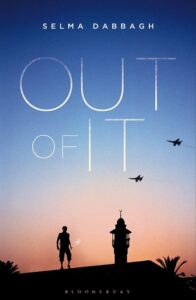
Out of It by Selma Dabbagh
In British-Palestinian Selma Dabbagh’s debut novel, Gaza is being bombed. Sound familiar? This is an insightful and powerful evocation of the contemporary Palestinian experience.
–Jordan Elgrably
Coriolis by A.D. Lauren-Abunassar
Easy as it is to uplift the truly unprecedented level of care and precision with which this book was crafted, a book like Coriolis never fails to return its readers to the body: “the body a thing / the body a tense / the body a prayer / of its own making,” where “each day [is] a study / of my body’s unbecoming.” These poems held my body, and lived in my body, through and beyond the winter days I spent with this book, therein dissolving the boundaries between world and poem, as easily as it dissolved the boundaries between states of consciousness. After reading Coriolis, I am emerging knowing I will be a devoted life-long reader of A.D. Lauren-Abunassar.
–George Abraham
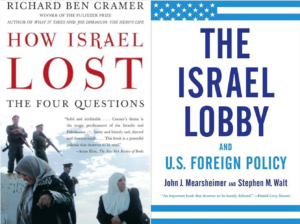
How Israel Lost: The Four Questions by Richard Ben Cramer, and The Israel Lobby and U.S. Foreign Policy by John J. Mearsheimer and Stephen M. Walt
Jewish author Richard Ben Cramer offers an unpopular critique of Israel and Zionism and its darker policies by asking four questions (in reference to the “four questions” asked at Passover): Why do we care about Israel? Why don’t the Palestinians have a state? What is a Jewish state? Why is there no peace? The questions are focused around Cramer’s assertion that over four decades of occupation and the subjugation of millions of Palestinians and the colonization of their land have corrupted Israeli policies and society, and formed a militarized country that asserts a brutal, apartheid-like regime. While Cramer critiques Israel, he’s simultaneously writing a love letter to it, marshalling the personal with the political. Another controversial but companionable book is The Israel Lobby and U.S. Foreign Policy by John J. Mearsheimer and Stephen M. Walt. This book’s question is: why does the U.S. support Israel? And the answer is as complicated as the response to this book, which is as complicated as the situation unfolding in the Middle East today. Together both books ask questions that don’t seem to be asked—or answered—often enough.
–Kerri Arsenault
A Map of Home by Randa Jarrar
I would like to suggest my own first novel, A Map of Home. I recommend it because it is the first novel written in English about a queer Palestinian girl coming of age
–Randa Jarrar
On Zionist Literature by Ghassan Kanafani (trans. Mahmoud Najib)
For those of us in the imperial core (and many outside of it), colonial processes are embedded into the fabric of everyday life. Included in this, of course, is Zionism—from mundane references to krav maga in sitcoms to active military propaganda in billion-dollar budget films, art has always played a role in severing Palestinians from their homeland. Ghassan Kanafani’s On Zionist Literature, translated from the Arabic by Mahmoud Najib, traces the proliferation of Zionist ideology in novels prior to the nakba, and how the canonization of these texts by literary and cultural institutions contribute to normalization. Kanafani succinctly theorizes, “…the Zionist novel positions itself carefully by disregarding half of the facts and exaggerating the rest.” As the propaganda engine attempts to manufacture consent in the midst of unfathomable violence unleashed on the people of Gaza, On Zionist Literature is a vital handbook for deconstructing those narratives—critiquing these literatures is a matter of life and death.
–Summer Farah
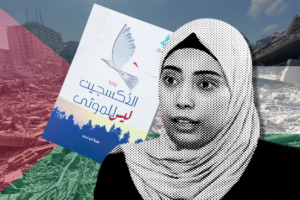
Oxygen is Not For the Dead by Heba Abu Nada
Novelist, poet, and educator Heba Abu Nada won the 2017 Sharjah Award for Arab Creativity for her acclaimed debut novel, Oxygen is Not for the Dead. A beloved figure in the Palestinian literary community, Abu Nada, in both her life and her writing, was preoccupied with justice, the uprisings of the Arab Spring, and the realities of Palestinian life under occupation. Heba Abu Nada was killed, along with her son, by an Israeli airstrike in her home in southern Gaza on October 20. She was just 32 years old. Neither Oxygen is Not For the Dead, nor any of Abu Nada’s poetry collections, have yet been translated into English, but that will hopefully change in the months and years ahead. Until then, here is a poem written by Abu Nada just ten days before her death.
–Dan Sheehan
**
Further Reading
Nonfiction
Greater Than the Sum of Our Parts: Feminism, Inter/Nationalism, and Palestine by Nada Elia
Out of Place: A Memoir by Edward Said
I Saw Ramallah by Mourid Barghouti
A Child in Palestine: The Cartoons of Naji al-Ali
The Hundred Years War on Palestine by Rashid Khalidi
Nothing to Lose But Your Life by Suad Amiry
A Mountainous Journey by Fadwa Tuqan
The Drone Eats With Me: A Gaza Diary by Atef Abu Saif
In Search of Fatima by Ghada Karmi
We Could Have Been Friends, My Father and I by Raja Shehadeh
The Ethnic Cleansing of Palestine by Ilan Pappé
Footnotes in Gaza by Joe Sacco
Palestine Speaks: Narratives of Life Under Occupation, ed. by Mateo Hoke and Cate Malek
Pay No Heed to the Rockets by Marcello Di Cintio
My Father Was a Freedom Fighter by Ramzy Baroud
Palestine: A Socialist Introduction, ed. by Sumaya Awad, Brian Bean
Palestine in Black and White by Mohammad Sabaaneh
The Way to the Spring: Life and Death in Palestine by Ben Ehrenreich
The Battle for Justice in Palestine by Ali Abunimah
The Question of Palestine by Edward Said
The Gaza Kitchen: A Palestinian Culinary Journey by Laila El-Haddad and Maggie Schmitt
A Day in the Life of Abed Salama by Nathan Thrall
They Called Me a Lioness: A Palestinian Girl’s Fight for Freedom by Ahed Tamimi and Dena Takruri
In My Mother’s Footsteps by Mona Hajjar Halaby
Justice for Some: Law and the Question of Palestine by Noura Erakat
Looking for Palestine: Growing Up Confused in an Arab-American Family by Najla Said
My Happiness Bears No Relation to Happiness: A Poet’s Life in the Palestinian Century by Adina Hoffman
Novels
The Blue Light by Hussein Barghouthi
Wondrous Journeys in Strange Lands by Sonia Nimr
Describing the Past by Ghassan Zaqtan
You Exist Too Much by Zaina Arafat
Exposure by Sayed Kashua
Enter Ghost by Isabella Hammad
In Search of Walid Masoud by Jabra Ibrahim Jabra
Second Person Singular by Sayed Kashua
The Dance of the Deep-Blue Scorpion by Akram Musallam
Mornings in Jenin by Susan Abulhawa
Haifa Fragments by Khulud Khamis
My First and Only Love by Sahar Khalifeh
A Woman is No Man by Etaf Rum
Fugitive Dreams by Ramsey Hanhan
Short Story Collections
Out of Time by Samira Azzam
The Book of Gaza, ed. by Atef Abu Saif
Jerusalem Stands Alone by Mahmoud Shukair
Jokes for the Gunmen by Mazen Maarouf
Palestine’s Children by Ghassan Kanafani
Her First Palestinian by Saeed Teebi
The Book of Ramallah, ed. by Maya Abu al-Hayat
Him, Me, Muhammad Ali by Randa Jarrar
A Curious Land by Susan Muaddi Darraj
Poetry
Footnotes in the Order of Disappearance by Fady Joudah
You Can Be the Last Leaf by Maya Abu Al-Hayyat
Journal of an Ordinary Grief by Mahmoud Darwish
Ever Since I Did Not Die by Ramy Al-Asheq
Nothing More to Lose by Najwan Darwish
The Butterfly’s Burden by Mahmoud Darwish
Birthright by George Abraham
Bitter English by Ahmad Almallah
Mural by Mahmoud Darwish
Rifqa by Mohammed El-Kurd
Before the Next Bomb Drops by Remi Kanazi
Dear God. Dear Bones. Dear Yellow. by Noor Hindi
So What: New & Selected Poems by Taha Muhammad Ali
Sadder than Water: Selected Poems by Samih al-Qasim
Children’s Books
Thunderbird by Sonia Nimr
Watermelon Madness by Taghreed Najjar and Maya Fidawi
Farah Rocks by Susan Muaddi Darraj and Ruaida Mannaa
Where the Streets Had a Name by Randa Abdel-Fattah
Tasting the Sky by Ibtisam Barakat
These Olive Trees by Aya Ghanameh
Homeland: My Father Dreams of Palestine by Hannah Moushabeck and Reem Madooh
Sitti’s Secrets by Naomi Shihab Nye and Nancy Carpenter
With thanks to ArabLit, Palestine Writes, and all of our contributors

